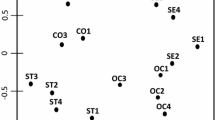Abstract
This study examines how our personal values influence our judgment of the morality of some workplace behaviours. Sixty-nine undergraduates were asked to rank order separately Rokeach's instrumental and terminal values in terms of their importance as guiding principles in their life. Subjects then read four scenarios, each of which described ethically questionable behaviour of the sort that might be encountered in business. They were then asked to rate whether or not the behaviour of the person described in the scenario was ethical, and whether or not they had any intentions to rectify the situation. People with different value hierarchies perceived the targeted behaviours differently. For example, subjects who valued “honesty” perceived the behaviour as more immoral than subjects who did not value honesty. While the ranking of the instrumental valuehonesty was the best predictor of people's judgments about the morality of the behaviour, their ranking of the instrumental valueambition was the best predictor of their behavioural intentions.
Similar content being viewed by others
References
Ajzen, J. and M. Fishbein: 1977, ‘Attitude-Behavior Relations: A Theoretical Analysis and Review of Empirical Research’,Psychological Bulletin 84, 888–918.
Ball-Rokeach, S., M. Rokeach and J. Grube: 1984,The Great American Values Test (Free Press, New York).
Benson, G. C.: 1989, ‘Codes of Ethics’,Journal of Business Ethics 8, 305–319.
Bowie, N.: 1982,Business Ethics (Prentice-Hall, Inc., Englewood Cliffs, NJ).
Brooks, L. J.: 1989, ‘Corporate Codes of Ethics’,Journal of Business Ethics 8, 117–129.
Chatman, J. A.: 1989, ‘Improving Interactional Organizational Research: A Model of Person-Organization Fit’,Academy of Management Review 14(3), 333–349.
England, G.: 1975,The Manager and His Values: An International Perspective (Ballinger, Cambridge, MA).
England, G. and R. Lee: 1974, ‘Managerial Success in the United States, Japan, India and Australia’,Journal of Applied Psychology 59(4), 411–419.
Friedman, M.: 1970, ‘The Social Responsibility of Business is to Increase Profits’,New York Times Magazine, Sept. 13.
Guth, W. and R. Tagiuri: 1965, ‘Personal Values and Corporate Strategies’,Harvard Business Review 43, 123–132.
Janis, I.: 1972,Victims of Groupthink (Houghton Mifflin Company, Boston MA).
Kohlberg, L.: 1969, ‘Stage and Sequence: the Cognitive Developmental Approach to Socialization’, in D. Goslin (ed.),Handbook of Socialization: Theory and Research (Rand McNally, New York).
Mathews, M. C.: 1988,Strategic Interventions in Organizations: Resolving Ethical Dilemmas (Sage Publications, Newbury Park, CA).
McDonald, P. and J. Gandz: 1991, ‘Identification of Values Relevant to Business Research’,Human Resource Management 30(2), 217–236.
McDonald, P. and J. Gandz: 1992, ‘Getting Value from Shared Values’,Organizational Dynamics 20, 64–77.
Miceli, M. P. and J. P. Neor: 1984, ‘The Relationships Among Beliefs, Organizational Position and Whistle-Blowing Status: A Discriminant Analysis’,Academy of Management Journal 27(4), 687–705.
Munson, J. M. and S. H. McIntyre: 1979, ‘Developing Practical Procedures for the Measurement of Personal Values in Cross-cultural Marketing’,Journal of Marketing Research 16, 48–52.
Posner, B., W. Randolph and W. Schmidt: 1987, ‘Managerial Values Across Functions: A Source of Organizational Problems’,Group and Organization Studies 12(4), 373–385.
Rokeach, M. J.: 1973,The Nature of Human Values (The Free Press, New York).
Ruegger, D. and E. W. King: 1992, ‘A Study of the Effect of Age and Gender Upon Student Business Ethics’,Journal of Business Ethics 11, 179–186.
Schwartz, S. and N. Inbar-Saban: 1988, ‘Value Self-confrontration as a Method to Aid in Weight Loss’,Journal of Personality and Social Psychology 54(3), 396–404.
Sims, R. R.: 1992, ‘The Challenge of Ethical Behaviour in Organizations’,Journal of Business Ethics 11, 505–513.
Terpstra, D. E., M. G. Reyes and D. W. Bokor: 1991, ‘Predictors of Ethical Decisions Regarding Insider Trading’,Journal of Business Ethics 10, 699–710.
Author information
Authors and Affiliations
Additional information
Joan Finegan is an assistant professor at the Centre for Administrative and Information Studies, University of Western Ontario. The general theme of her research is the application of social-psychological concepts to organizational behaviour.
Rights and permissions
About this article
Cite this article
Finegan, J. The impact of personal values on judgments of ethical behaviour in the workplace. J Bus Ethics 13, 747–755 (1994). https://doi.org/10.1007/BF00881335
Issue Date:
DOI: https://doi.org/10.1007/BF00881335




